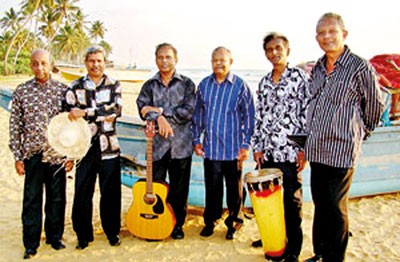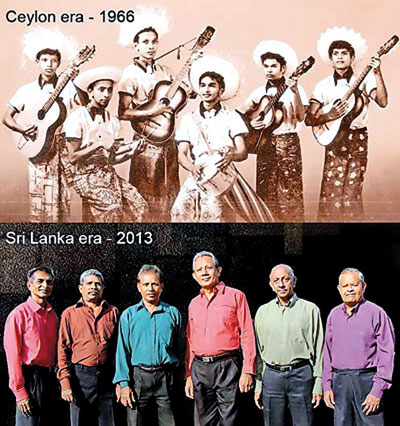‘La Bambas’ Unbroken for lifetime
View(s):By Sanath Weerasuriya
‘La Bambas’ emerged as a trailblasing and pioneering harmony-singing musical group from the musically rich city of Moratuwa during the group song era of the 1960s and ‘70s. Had they remained active as a band, they would be celebrating their 59th anniversary in May. Although the members had been singing and performing even earlier, they officially recognise their performance on 25th May 1966 at the iconic ‘Coconut Grove’ of the Galle Face Hotel — a special appearance at the Observer Talent Contest, as their true baptism into what would become a long, unbroken, and eventful musical journey.

It was a spontaneous and inspired idea by Priya Peiris of ‘Cock-o-Doodle’ fame and his uncle Brian Fernando that sparked the formation of a harmony-singing group in the musically vibrant city of Moratuwa. Their vision was to create a band in the vein of popular acts of the time such as ‘Los Caballeros’, ‘La Ceylonians’, and ‘Amigos Románticas’, who were then captivating connoisseurs of quality music across the country.
Priya and Brian wasted no time in gathering a few trusted, talented, and like-minded friends to form a band—purely for the joy of music and as a dedicated pastime. They reached out to familiar faces: Lasla Fernando, Erinton Perera and Rolinson Ferdinando—all previous acquaintances. Thus, by late 1964, the group had unofficially come together as a musical unit, even while most of its members were still schooling. A close friend, Sunil Perera, also joined the ensemble briefly but had to step away due to his impending migration for higher education abroad. His departure, however, paved the way for Rolinson’s brother-in-law Malsiri Wijesuriya, to be brought into the fold, further solidifying the group’s foundation.
Since those early days, ‘La Bambas’ performed together as an inseparable and united group of exemplary musicians—until the passing of Brian in 2013. ‘Being together, unshaken, for 47 years might seem unimaginable for many bands today, but our mindset about music was very easygoing and different’ recollected Priya Peiris during this interview.
The band’s most notable and consistent performances were during the late 1970s and throughout the 1980s at Hotel Lanka Oberoi (now Cinnamon Grand), where they held a long-term contract for nearly 15 years. There, they entertained primarily foreign tourists with a unique repertoire that spanned a wide range of cultures and languages. La Bambas were perhaps the only musical group of their time to master such a remarkably international selection of songs. Their performances featured English, Scottish, Welsh, and Irish standards, American plantation and cowboy classics, and a rich variety of Latin American melodies—alongside many other global hits.
‘I’m not boasting, but I still don’t think any other musical outfit has performed at the same venue for fifteen long years. It was not an easy task—it was a real challenge, but one we managed to turn into reality’ said Priya.

La Bambas’ first 45 rpm extended play (EP) record was a single-track recording produced in 1967 at Felix Ranaweera’s studio—an improvised space adjacent to the popular Bamba flats, essentially a bedroom converted into a makeshift studio.
‘Everything had to be recorded simultaneously—vocals, guitars, conga drums, percussion instruments—something today’s musicians can hardly imagine, let alone dream of’ quipped Priya, fondly reminiscing about the early days.
During this period, both Priya and Brian had become acquainted with a young girl named Christine Fernando at Radio Ceylon. She featured on that first record and later joined the group for a few stage performances. When Noel Ranasinghe of ‘La Ceylonians’ was on the lookout for a talented female voice for an upcoming Philips label recording, La Bambas, without hesitation, recommended Christine. That introduction proved to be a turning point, eventually leading her to fame with the song ‘Mali Ruwanmali’.
La Bambas firmly believed that, much like the Latin American vocal groups and other quality local bands of the time, acoustic instrumentation was the most fitting accompaniment for harmony-based music. Staying true to this belief, they continued their entire musical journey with an unplugged sound, never deviating into electronic or heavily amplified arrangements.
Though music-making remained a leisurely pastime for the group, their 1968 hit ‘Cock-a-Doodle-Doo’ stands out as a landmark achievement. It is still remembered as the only English-language song to emerge from the ‘Kandyan gee’ era. Other memorable tracks—‘Nuwara Menikela’, ‘Enna Yanna Nelum Wile’ and ‘Piyakaru Mala Oba We’—also continue to live on in the hearts of passionate group song enthusiasts across generations.
Searching for that next furry family member but couldn’t find one in your area? Hitad.lk has the solution with our extensive listings of dogs for sale in Sri Lanka!


